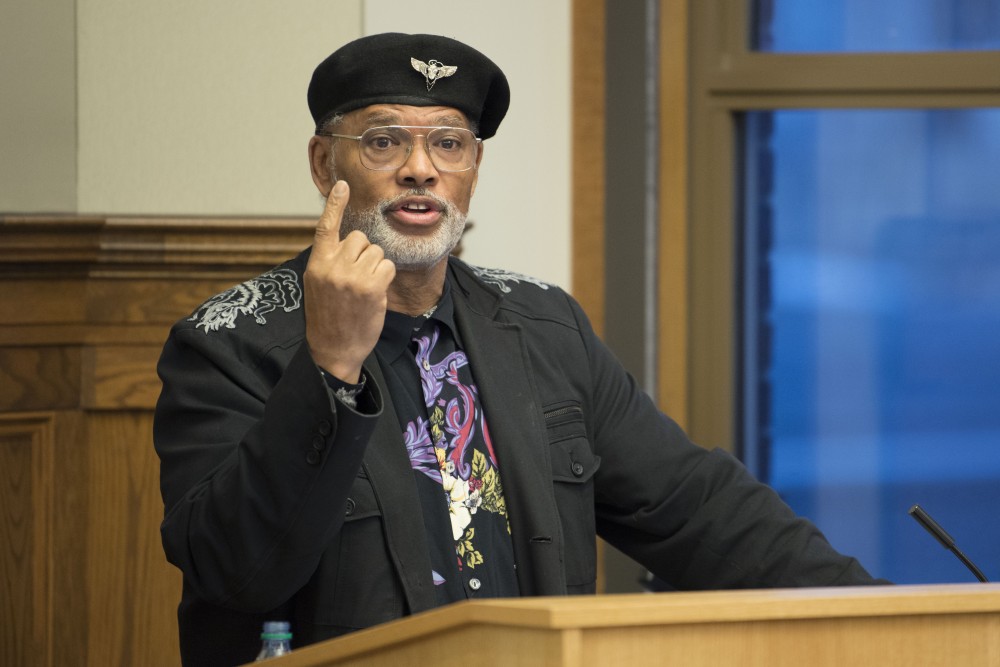“Savor these days, they won’t come again,” is the advice John Wright said he would have told his younger self — before overtaking Morrill Hall, before helping found an African studies department in the 60s, before coming to the University of Minnesota.
After decades as a professor, Wright retired from his post this year.
From his origins as a fourth-generation Minnesotan to a 35-year teaching tenure, Wright played an integral part in the formation of the Department of African American and African Studies at the University in 1969. The curriculum was created in part by his role in the Morrill Hall takeover, which was a response to the University administration’s lack of action on creating an African studies department.
“It is what made these extraordinary people — that a lot of people don’t know about — extraordinary. And it’s how their lives change the course of history; he reminds me of those people,” Serena Wright, director of Alumni Relations, said of her husband. “What he has done here at this University, and also outside of the University, has changed the course of history.”
Wright was familiar with the material presented in “A Campus Divided,” a University exhibit detailing Jim Crow laws in the 1930s. His father and aunt faced them on campus.
However, his father instilled the importance of attending college in his home state.
“[My father] said, ‘Regardless of what the University does that may be unjust or unfair, you have full right to go to that university and expect to be treated fairly and with respect and develop your talents as best you may,’” Wright said.
John Wright is thoughtful. AAAS professor Rose Brewer said Wright often has “John Wright” moments — moments when he brings his deep knowledge of an issue into a conversation.
“To really understand the deep history of black studies, it didn’t just start in the late 1960s,” Brewer said. “I think when you look at some of the early framing of the mission of the department, it very much reflects his erudition — his knowledge around black studies itself.”
He helped build the department by using his research in African American studies and literature to understand the global black experience.
“The role he played in the department in ensuring that … our survival as a unit, it’s imperative that we have covered the entire diaspora … when we think of Africa and peoples of African descent,” said current department chair Tade Okediji.
Josie Johnson, the first black woman to serve on the Board of Regents, met Wright in 1967 when he was a student and she was a community activist. She describes him as bright, serious and deeply committed to his values.
“I think he modeled the inspiration of our ancestors of education. Education was highly praised by our brothers and our ancestors from before slavery, after slavery, and today,” Johnson said. “John has maintained that kind of commitment to African American people, to our history, to our culture, to the value that so many black scholars have brought to various academies.”
Wright said the AAAS department grew from an attempt to bridge the divide between the campus and the community long before the University officially adopted a community outreach agenda.
On Jan. 14, 1969, the Afro-American Action Committee held a 24-hour sit-in inside Morrill Hall to advocate for an AAAS department, among other demands, which Wright authored for the group.
On the day of the takeover, Wright said opposing protesters remained outside after the committee had already reached a resolution with the campus administration. The students used the tunnel system from Morrill Hall to Smith Hall to avoid confrontation.
He recalls departing the basement tunnels on the bright, sunny January day. “It had a kind of metaphorical resonance,” he said. He said they were jubilant as they crossed the bridge and reassembled in front of the student union.
Wright’s former student Lou Bellamy, founding artistic director of the Penumbra Theatre in St. Paul, remembers a profound moment in one of Wright’s classes. He said a piece of folklore they studied was very similar to a story told by his grandparents growing up.
“To have that kind of ownership of the printed page and the experience that I thought was unique only to me and my family — to find out this is what black people are … I can’t describe for you how empowering that moment was,” Bellamy said.
Wright’s attentiveness to students shows even to his last lecture day, Okediji said, who described how he and faculty had their own “Morrill Hall takeover” by walking in on his final class. Okediji said Wright still had a lesson prepared for his last day.
After his retirement, Wright will continue as a professor emeritus in the AAAS department.
“When I first met my husband, I asked him if he ever got bored,” said Serena Wright. “He said, ‘I have so many things and so many projects working in my head, I have never been bored in my life.’”

















